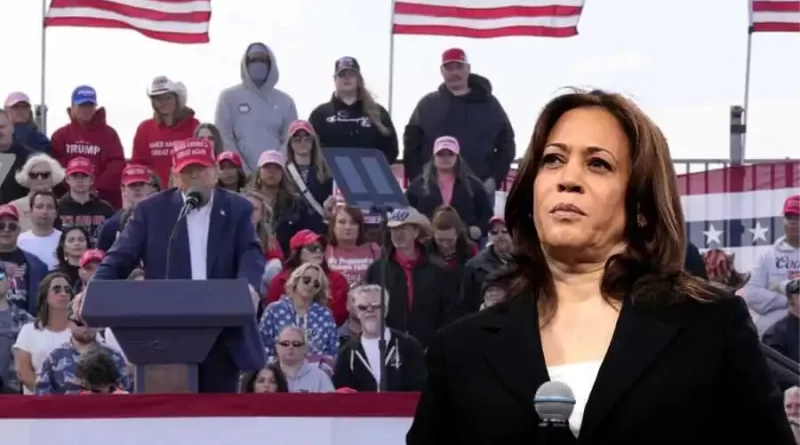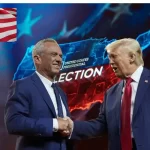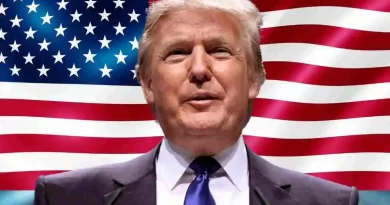In a Fiery Campaign, Kamala Harris brands Trump as ‘fascist and unstable’
Vice President Kamala Harris while addressing the crowd during a campaign, made a scathing attack on her Republican political rival, Donald Trump, and described him as “increasingly unhinged and unstable”. Speaking to the public in front of the Vice-Presidential residence, she was referring to the remarks by the former White House Chief of Staff, John Kelly when he passed the statement against Donald Trump in a New York Times interview.
The White House Chief had described Trump as “the general definition of fascists,” and that the Former President had seemingly approved the doings of Hitler in many of his campaigns. Harping on the comments of The White House Chief, Kamala Harris further highlighted his views and made allegations that Trump was seeking “unchecked power”. Later on In the day, when at a CNN town hall event, she was asked whether she viewed Trump as a fascist, she replied “Yes, I do”.
Trump responds to Kamala in his campaign
Responding to her comments on social media platforms like X and Truth Social, he cited this as the mark of desperation on her side in her political campaigns and that she was losing. Trump said she was “increasingly raising her rhetoric, going so far as to call me Adolf Hitler, and anything else that comes to her warped mind”.
Comrade Kamala Harris sees that she is losing, and losing badly, especially after stealing the Race from Crooked Joe Biden, so now she is increasingly raising her rhetoric, going so far as to call me Adolf Hitler, and anything else that comes to her warped mind. She is a Threat…
— Donald J. Trump (@realDonaldTrump) October 24, 2024
As campaigns near their peak, candidates often adopt a more confrontational tone, particularly in close, high-stakes races like the 2024 presidential election. Such tactics are used by the candidates to gain the trust of the supporters who feel more energetic and thus the party seems to benefit from it.
However, Kamala seems to turn to this sharper tone with a strategy from her earlier stance of focusing on a positive note and a hopeful message.
Change of strategy to counter Trump
It was President Joe Biden who was given the responsibility of this part of the campaign against Trump in the earlier days. Biden used that opportunity in his campaigns to the fullest when he consistently tried to frame Trump as a threat to democracy. So, till now, Kamala has taken backstage in this context and avoided the discussion regarding Trump in the campaigns.
But political analyst Matt Bennett from the Democratic group Third Way suggested that Harris’s emphasis on Kelly’s statements was a tactical decision to raise awareness about Trump’s alleged authoritarian tendencies.
“Every move she makes now is strategic,” he explained. “It was essential for her to ensure as many voters as possible heard Kelly’s perspective.”
This approach also aligns with Harris’s recent efforts to attract independent voters and moderate Republicans who may be open to considering the Democratic ticket. Polls indicate a tight race, with neither candidate securing a decisive lead in crucial battleground regions. Suburban areas around major cities in battleground states—such as Philadelphia, Detroit, Milwaukee, and Phoenix—are home to a significant number of educated professionals, many of whom traditionally support Republicans but reportedly have reservations about Trump’s return to office.
Bennett noted that Harris’s strategy hinges on forming a broad coalition by appealing to disillusioned Republicans who are uncertain about voting for Trump again.
Devynn DeVelasco, a 20-year-old independent voter from Nebraska, exemplifies this sentiment. While she already plans to support Harris, she worries about public fatigue regarding criticism of Trump. “When Kelly’s remarks surfaced, I wasn’t surprised; it didn’t change my views much,” she told the BBC.
Republican strategist Denise Grace Gitsham believes that many voters have heard similar criticisms of Trump since 2016, so recent allegations are unlikely to sway undecided voters. “If you oppose Trump because of his personality, you’ve likely made your decision,” she explained. “But if you prioritize policies over personality, you’re more inclined to support the candidate whose policies benefited you the most while in office.”
Recently, both Harris and Trump have intensified their critiques of one another. During a campaign stop in the Midwest, Harris spoke repeatedly about the potential impact of a Trump presidency on issues such as abortion, healthcare, the economy, and U.S. foreign relations. She is set to hold a rally in Texas, pointing to the state as a stark example of the anti-abortion future she warns could unfold under Trump’s leadership.
Trump has continued his attacks on Harris, accusing her of incompetence and suggesting she was chosen as a nominee due to her gender and ethnicity. Speaking in a campaign at a town hall in North Carolina, he warned that “America might not survive” a Harris victory.
Political strategist Matt Bennett believes Harris’s approach, which focuses on winning over anti-Trump Republicans and independents, carries some risk. “With finite resources, any time allocated toward one approach inevitably detracts from another,” he noted. “The way you allocate a candidate’s time and advertising budget is critical.” With Trump being a divisive figure in American politics for nearly a decade, most voters hold strong, entrenched views about him. Harris’s intensified stance on Trump could give her the edge if anti-Trump sentiments drive more people to the polls. If not, the post-mortem analyses will likely be swift and intense.








